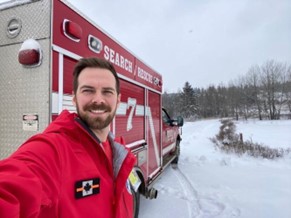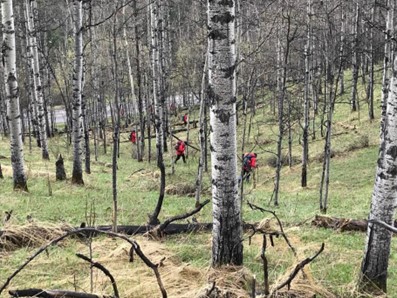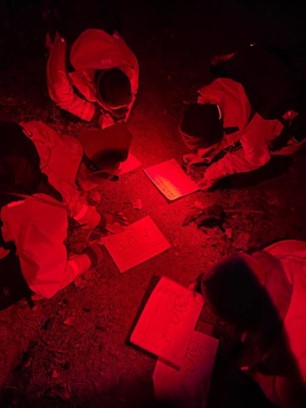When I joined my local search and rescue team, I was not expecting it to be a particularly spiritual experience. The work of search and rescue can be concrete: supplies to prepare, transportation to arrange, and an area to clear. These things need to happen efficiently and there is great satisfaction in being able to carry out a search well. As in medicine, there is also an extraordinary amount of learning and training that can be done to improve how search and rescue is carried out. However, like in many other aspects of life, it is easy to become so focused on how to do search and rescue that I neglect a more philosophical question: why I do search and rescue. Working with a great team, helping the community, and being able to combine multiple passions are all great reasons for me to be involved. However, I have been reflecting recently on another reason I pursue this endeavor: I have been seeing my spirituality displayed in the work that SAR does.

The author at a SAR exercise. (Jayden Dyck)
I was particularly struck by this while reading through the parable of the lost sheep in the Bible: In this metaphorical story told by Jesus, there is a shepherd with one hundred sheep. One of these sheep goes missing and the shepherd leaves the rest of the ninety-nine sheep to go find the missing one. Of course, Jesus tells the story with a spiritual lens; God is the Good Shepherd, seeking and redeeming his beloved children who are lost. I understand this cognitively, but as can happen with things that happened long ago, sometimes the analogy does not have quite enough modern-day connection to make an impact. In the agricultural context of Jesus’ day, shepherding was a visible and obvious example from which a teacher could create a story. People were acquainted with shepherds’ work, while I certainly do not know much about shepherding. Search and rescue is my modern-day analog. My experiences on a SAR team has contextualized this story for me and has given me a new understanding of my faith as well as the importance of SAR.

A ground search and rescue team performing a search. (Mark Smith/Cochrane Search and Rescue)
With some adjustments to the story, I noticed the depth of my understanding increase. Now, I can imagine a searcher . He realizes there is a lost subject and he immediately springs into action. He makes a plan before he leaves. He knows this land and he knows where his subject might be found, but there are many possibilities, so he weighs each carefully in his mind. I can understand how well he knows the dangers of the surrounding countryside and what type of hazards he might encounter, so he prepares to face these. In fact, there is likely a sense of urgency to his search: a lone subject lost in the wilderness is at tremendous risk from predators, dangerous terrain, and exposure. So, he sets out quickly and intentionally, looking up, down, and all around. He probably has a checklist in his mind to keep track of where he’s been and where he should be going next, systematically clearing each area from highest probability to lowest probability. He may expose himself to hunger, cold, injury, or fatigue in search of his subject. He might spend hours, working through the night, recruiting any help he can to find to get the job done. Finally, he finds the subject and the discomfort and struggle are all worth it. He celebrates his successful search: a job well done and the life of a valued subject saved. He gathers his friends together and has a party!
I love to reframe the story in this way because a lot of the themes I see from wilderness medicine and rescue contexts are themes that Jesus talks about in the Bible. Just as a lost person may be caught in a sudden storm and taken off guard, a sudden tragedy or hardship can be an emotional storm that throws me off course. Jesus spoke to this in the Bible, calming a literal storm and using it as a lesson that he rescues us from the storms in our lives as well. Some people are caught by a rapidly approaching nightfall and lose sight of their path, and if I am not living out my faith then I can feel the same- as if I am wandering in the dark. I can start to doubt, and second guess my values and the purpose of my life. Jesus says that he is the light of the world. He makes clear the road ahead- he illuminates my path. Just as those who are lost may experience physical hunger and thirst, I can experience a restless ambition if I stop pursuing God’s will and instead follow my own selfish desires. Jesus says that he is the bread of life, and that by coming to him we will no longer hunger or thirst. He alone can satisfy the fundamental longings of every heart.

Searchers planning a navigational route at night. (Jessica Tinholt/Cochrane Search and Rescue)
By contextualizing the story to my own experiences, I can see God’s devoted pursuit of his children reflected in the way we search for lost subjects. The shepherd pursues his goal with urgency and intentionality because the need for rescue is time sensitive. He leaves immediately to search, showing that every sheep is valuable. The shepherd perseveres in the search until the sheep is found. There are searches that last days, but to the best of our abilities we persevere for the good of the lost person. The shepherd does not play favoritism, but searches for anyone who needs it, even one sheep among many. He searches diligently because each of the sheep is important to him.
The story also teaches me how I should be carrying out my duties, whether I am searching for someone who is lost, practicing for a mass casualty event, seeing a patient in my family medicine office, or spending the weekend with my kids. It also teaches me why: because there is Someone searching for me. Just as we go and search for a subject like the shepherd in the story, God is also pursuing each of us in that same way.
In most searches, the lost person plays a very important role. Their choices hold immense sway in the outcome of the search. The fact is that some people do not want to be found. Some people are actively running away. Those people can be the most difficult to find. Putting myself into the subject’s shoes, each new SAR call becomes a reminder that I also need a spiritual rescuer. I have never needed to call SAR for myself, but in Jesus’ story, I am the sheep. I am the subject. Jesus calls himself the Good Shepherd. Now I also call him the Good Searcher.